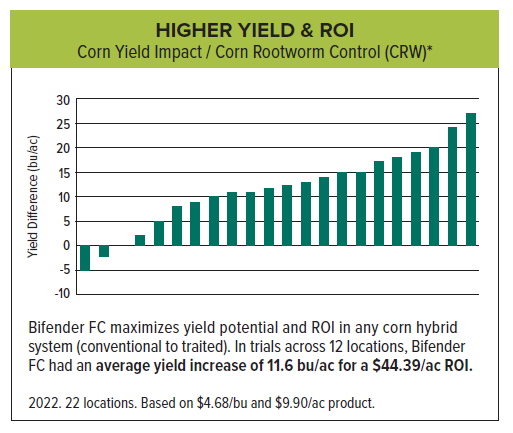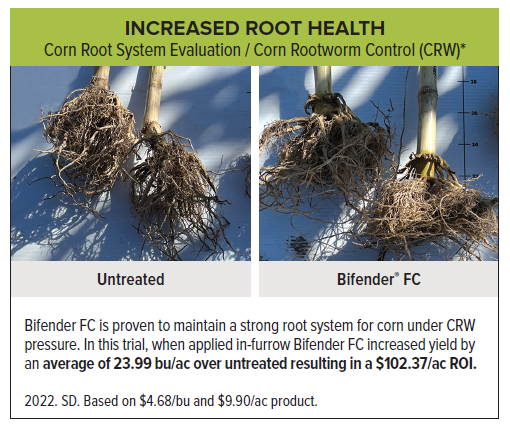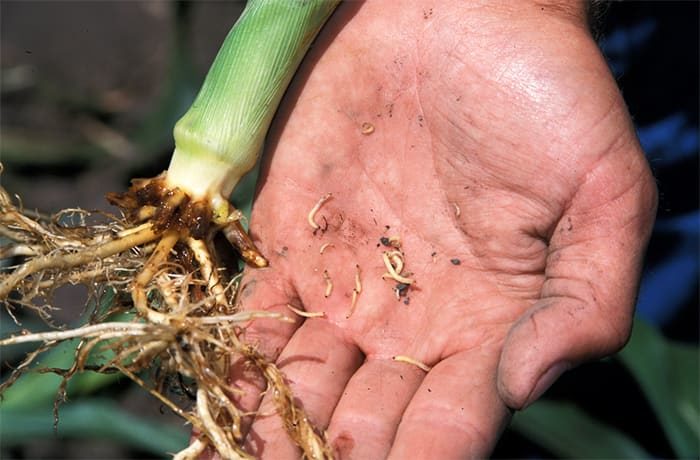Corn rootworm (CRW) is one of the most damaging pests affecting US corn growers. These insects target corn roots during their larval stage, causing significant yield losses and compromising plant health. Understanding the biology, behavior, and management strategies for corn rootworms is essential for mitigating its impact on corn quality and yield.
Corn rootworm undergoes a complete metamorphosis, with four life stages: egg, larva, pupa, and adult beetle. The larvae, commonly known as rootworms, are the most damaging to corn plants. They feed voraciously on corn roots, causing injury that impairs nutrient and water uptake, leading to stunted growth, lodging, and reduced yield.
Picture 1: Corn Rootworm larvae. Photo credit: Purdue University
Corn rootworm infestations can have devastating effects on corn fields, resulting in both immediate and long-term consequences for growers.
- Yield Losses: Larval feeding on corn roots disrupts the plant's ability to uptake water and nutrients, leading to reduced vigor and decreased photosynthesis. Severe infestations can result in significant yield reductions, impacting farm profitability.
- Lodging and Standability Issues: Weakened root systems from corn rootworm damage compromise plant anchorage, increasing susceptibility to lodging during adverse weather conditions, such as wind or heavy rainfall. Lodged plants are difficult to harvest and can result in further yield losses and harvesting challenges.
- Increased Risk of Secondary Infections: Corn rootworm damage creates entry points for pathogens, increasing the risk of secondary infections by soil-borne diseases such as Fusarium and Pythium. These infections further weaken plant health and exacerbate yield loss.
Effective management of corn rootworm requires an integrated approach that combines IPM methods to reduce pest pressure and minimize economic losses.
- Crop Rotation: Rotating corn with non-host crops such as soybeans or small grains disrupts the rootworm life cycle by depriving larvae of their preferred food source. This practice helps reduce rootworm populations and mitigate damage in subsequent corn crops.
- Insect-Resistant Corn Hybrids: Planting genetically modified corn hybrids engineered to express traits resistant to corn rootworm offers effective protection against larval feeding damage. These hybrids produce toxins lethal to rootworm larvae to minimize yield loss.
- Monitoring and Scouting: Regular monitoring and scouting for corn rootworm adults, egg masses, and root damage help growers assess pest pressure levels and determine the need for targeted management interventions. Early detection allows for the timely implementation of control measures.
- Soil Insecticides: Soil-applied insecticides provide additional protection against corn rootworm larvae by targeting them during their feeding stage in the soil. These products can be applied at planting to create a protective barrier around the roots, preventing root damage and preserving plant health. Many growers have found Bifender® FC insecticide to be an effective way to control corn rootworm in-furrow due to its ease of use, proven performance, and targeted compatibility.


Corn rootworms pose a significant threat to corn production calling for proactive management strategies to mitigate its impact on yield and plant health. By understanding the biology, behavior, and management options for corn rootworms, growers can implement integrated pest management practices that reduce pest pressure, preserve crop productivity, and ultimately increase yields and ROI and the end of the season.
Important: Always read and follow label directions. BIFENDER FC IS A RESTRICTED USE PESTICIDE. Allosperse®, Bifender®, and Precision Chemistry™ are trademarks of Vive Crop Protection Inc. ©2024 Vive Crop Protection Inc.

